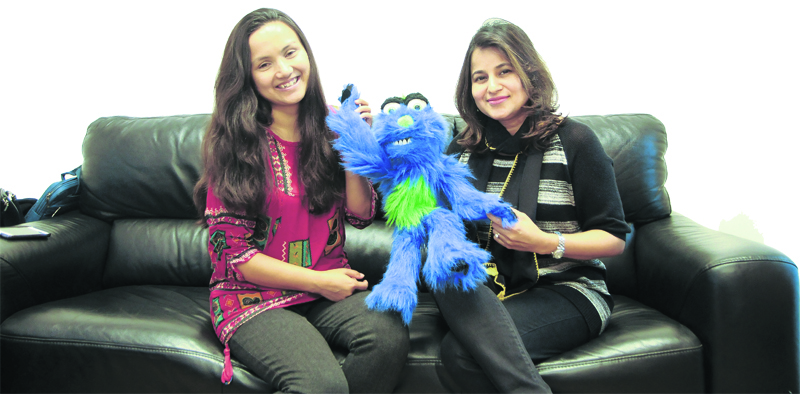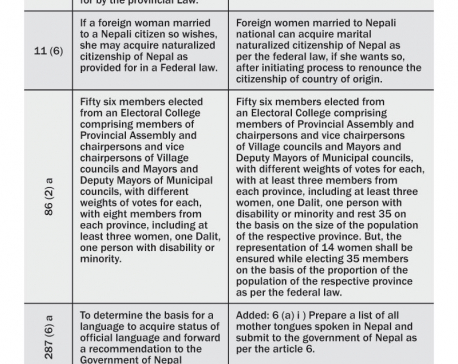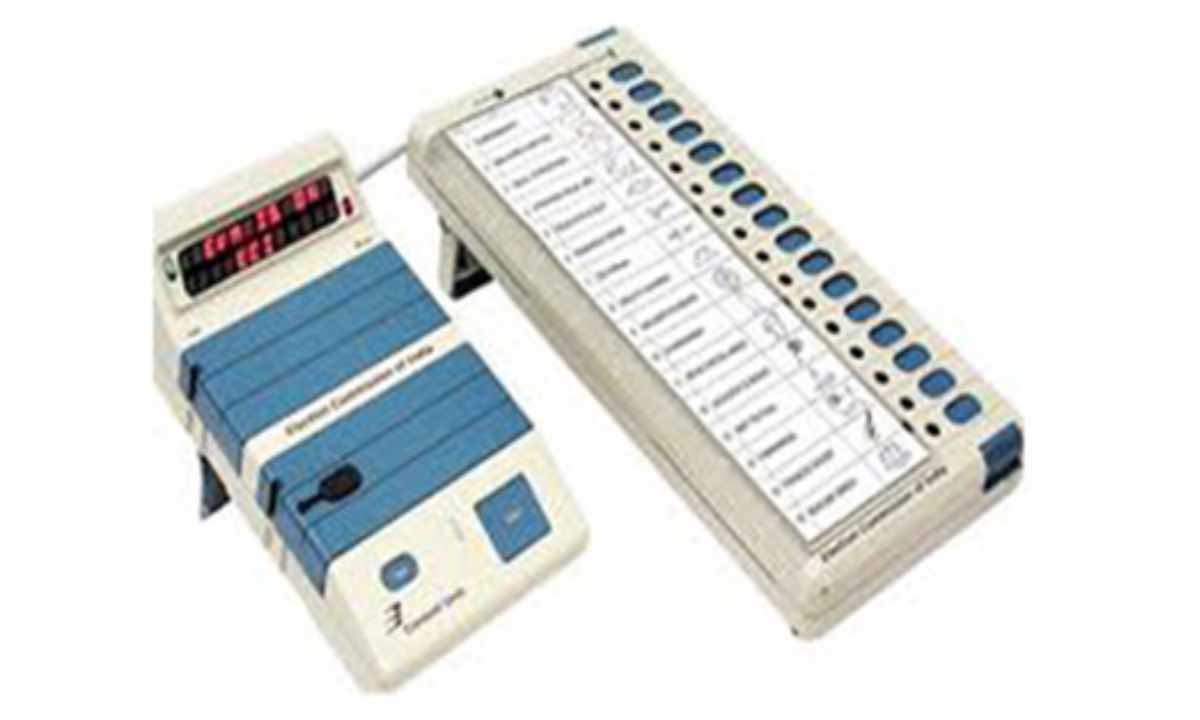
OR
The stand-up point of view
Published On: March 31, 2017 12:30 PM NPT By: Republica | @RepublicaNepal

Trying to be funny in front of a room full of strangers is nothing to joke about and while some might go as far as categorizing it as their personal nightmare, some Kathmanduities are taking up the challenge. Toastmasters, for the last couple of years, has been serving as a platform for a close circle of friends and acquaintances to unleash their inner comedian.
Their entertaining weekly gatherings are even known to rustle up a room full of attendees at settings like the Dhokaima Cafe. But now, two of the Toastmaster clubs permanent fixtures, Shailee Basnet and Seema Golchha are actively trying to expand the stand-up scene in the capital.
In fact, they are starting quite big at the Soaltee Crown Plaza with their ‘Fool’s Night Out’ show featuring themselves and Indian comedian, Vasu Primlani, on perhaps the most apt day possible, April 1, this weekend. They are calling it ‘a start’ – a start of an open mike culture in the country. And, in these early days, even though they themselves can’t guarantee if these plans will pan out, at the very least, they are certain that it is going to be worth a laugh.
So while preparing for their upcoming show, Basnet and Golchha spoke to Priyanka Gurung about their open mike experiences and stand-up aspirations.
“Building our own platform.”
There is no denying that comedy in Nepali entertainment industry is much more evolved as compared to other performing arts. But stand-up is still incredibly new to this part of the world. While we do have iconic figures like Haribansha, Madan Krishna or incredibly popular shows like Tito Satya, so far, they have all stuck to similar forms of comedy.
Skits and character-based performances are the most widespread at the moment.
Stand-up, especially one in English, is almost never heard of, which is why Basnet and Golchha find themselves as the organizers of their upcoming show.
“Unlike other countries, there isn’t a readymade platform where we have the opportunities to perform. So far, with clubs like Toastmasters, we have had to come up with our own events and shows,” shares Golchha.
According to them, this should help give Nepali comedy a younger take and add more variety. So they are starting with themselves and those around.
“I was never the funniest in the room.”
None of the members of the Toastmasters club are professional comedians and Basnet and Golchha are no exceptions either. Basnet reveals that initially she just wanted to see if she could be funny while taking on public speaking whereas, Golchha apparently didn’t even expect to actually be required to speak or present anything. Today, of course, the story line differs. Both have had plenty of experience doing stand-up in the valley as well as participating in open mike events abroad in America and India respectively.
Nevertheless, when asked about what gives them the confidence and the courage to get on stage, they candidly confess, “We are a nervous wreck before the shows. Courage? Confidence? That’s questionable. Performing stand up is like being in a trance.”
So why do they do it? Besides the obvious thrill afterwards and the fun factor, Golchha says, “Everybody has a different sense of humor. I can’t pull off jokes that Shailee can and vice versa. There only needs to be a space to bring it all out. Then as it turns out, it’s just about stepping out and getting it done.”
“Gauging the decibel of laughter.”
“During stand-up shows, it isn’t enough to have a relatively satisfied audience, pleasantly smiling at you,” says Basnet. “The jokes are judged on the decibel of laughter. It’s about whether you can have them rolling on the floor.”
And almost immediately Golchha adds, “It’s easier to make someone cry.”
Laughter is certainly a difficult emotion to evoke. What with everybody having a different sense of humor, it can be tricky to connect with the entire room. Their experience together has also taught them that it is also a cultural thing.
Basnet elaborates, “The crowd in Kathmandu compared to the crowd in the US or India is completely different. In fact, you don’t even have to go to different countries. When I was performing in comedy clubs in the US, the crowd in Colorado in comparison to New York itself was a totally different experience. So you have to prepare accordingly.”
Where our capital’s audience is concerned, so far relationship jokes and socio-political satires, they say, manage to get the best responses.
“While being born with a quick wit helps, what’s most important is a perspective.”
Whether it is Golchha’s old, married hag of a husband puppet, Jack Denials, complaining about his wife or Basnet’s conspiracy theories regarding women’s multitasking abilities, these two aspiring stand-up comedians share that the best way to entertain an audience is to either have them relate to you or take them by surprise.
The materials for their joke mostly come from their own experiences. They may collect one-liners or immediately note down funny anecdotes that come to mind but at the end of the day, they explain that it is about bringing your perspectives to certain matters.
“You can learn a few tricks, create scenarios, use puns or ironies but how are you going to bring it all together? That matters, if you want to connect with the crowd,” says Basnet. She also adds that it hasn’t been long since she realized all this. Whenever some of her favorite comedians like Seinfield gave aspiring stand-up comedians advices like “find your voice” or “be true to yourself “, Basnet confesses that she didn’t quite get it. She was happy as long as people laughed but over time, she says she has noted a difference.
“The punch lines that have been the most successful are the ones that I could relate to the most. I guess it affects the delivery, and my conviction. Stand-up isn’t acting. When you believe in something, it will have an impact on the audience as well.”
Dirty jokes, F word, where do you draw the line?
Stand-up comedians are obviously famous for their free use of language and expression of views, but will the Nepali crowd be able to digest it? It’s a question that they are waiting to find an answer to. Basnet and Golchha say that body jokes and sex jokes aren’t exactly out of limits at the moment. They do crack jokes about these things every now and then. Where the cuss words are concerned though, it’s apparently personal preference.
“When I’m performing my ventriloquism act with my puppet, his character is rude and grumpy and people especially seem to love the snarky remarks. But cursing, personally, isn’t my style so I don’t do it, even though sometimes cursing does feel like the easiest way to elicit laughter,” says Golchha.
“Any excuse to share humor.”
If the stand-up scene were to expand, all of us might know of somebody who could participate, give it a try or, at least, be interested in attending. It’s a fact that has encouraged Golchha and Basnet to pursue this venture seriously. Apparently, they are already thinking about the next show after the ‘Fool’s Day Out’ event. This is all in a bid to help the stand-up comedy scene so that, unlike them, those interested will know where to go. After all, as they put it, being funny is all about practice. The more you do it, the better you will get at it.
You May Like This

Govt, Dr KC finally agree on disputed point, seal 22-point deal
KATHMANDU, July 26: The government and Dr Govinda KC have agreed on the disputed points that had halted on the... Read More...

NC presents 22-point dissenting view on reconstruction authority
Kathmandu, June 24: The main opposition party – Nepali Congress – today presented a 22-point dissent letter citing political intervention... Read More...

Govt registers 7-point constitution amendment bill
KATHMANDU, Nov 30: The government on Tuesday evening registered a seven-point constitution amendment bill at the parliament secretariat, proposing, among... Read More...






Just In
- Youth attempts suicide amid police torture over Facebook comments against home minister
- Time to declare EVMs’ end
- World Malaria Day: Foreign returnees more susceptible to the vector-borne disease
- MoEST seeks EC’s help in identifying teachers linked to political parties
- 70 community and national forests affected by fire in Parbat till Wednesday
- NEPSE loses 3.24 points, while daily turnover inclines to Rs 2.36 billion
- Pak Embassy awards scholarships to 180 Nepali students
- President Paudel approves mobilization of army personnel for by-elections security












Leave A Comment